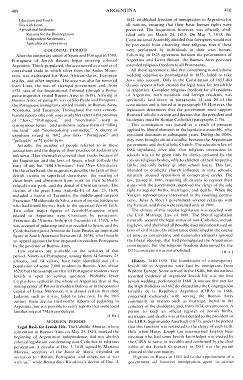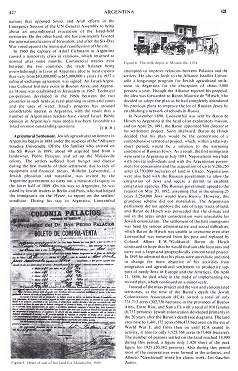|
|
|
Encyclopaedia Judaica
Jews in Argentina 03: 1810-1890
Emancipation of the Jews step by step - immigration of Russian Jews since 1881 - French anti-Semitism
from: Argentina; In: Encyclopaedia Judaica 1971, vol. 3
presented by Michael Palomino (2007)
| Share / teilen: |
Facebook |
|
Twitter
|
|
|
|
[Some emancipation for the Jews since 1853]
MODERN PERIOD
Legal Basis for Jewish Life.
The Cabildo Abierto [[open council of the town]], whose convention in Buenos Aires on May 25, 1810, marked the beginning of Argentinian independence, did not abolish colonial legislation condemning non-Catholics to religious persecution. A circular of Dec. 3, 1810, signed by Mariano Moreno, secretary of the Junta de Mayo, extended an invitation to the "British, Portuguese, and others not at war with us", while Bernardino Rivadavia's decree of Dec. 4, (col. 409)
1812, established freedom of immigration to Argentina for all nations, ensuring that their basic human rights were preserved. The Inquisition, however, was officially abolished only on March 24, 1813. On May 7, 1813, the Constitutional Assembly decided that foreigners would not be prevented from observing their religious rites if these were performed by individuals in their own homes.
Following an 1825 agreement between the governments of Argentina and Great Britain, the Buenos Aires province extended religious freedom to all Protestants.
All these agreements, like that concerning non-Catholic wedding ceremonies promulgated in 1833, failed to take Jews into account. Only in the Constitution of 1853 did clauses appear which created the legal basis for Jewish life in Argentina. Complete religious freedom for all residents of Argentina, both nationals and foreign residents, was specifically laid down in paragraphs 14 and 20 of the constitution and is hinted at in paragraph 19.
However, the legislation determines that the government must support Roman Catholic worship and decrees that the president and his deputy must be Roman Catholics (paragraphs 2, 76).
[1884: Education law for the separation of church and state school - 1888: Civil Marriage Law]
This constitution was passed as a result of pressure applied by liberal elements in the legislative assembly, who remained dominant in subsequent years. During the 1880s they even brought about a conflict between the Argentinian government and the Catholic Church. The education law of 1884 stipulated, inter alia [[among others]], that religious instruction in schools was to be given only by clerics ordained by the various religious bodies, only to children of their respective faiths, and only before or after school hours. This law, intended to eradicate church influence in state schools, naturally aroused opposition in conservative circles. The law, passed in 1886, requiring all citizens to register their status with the government, deprived the clergy of the sole right to register births, marriages, and deaths. When the Vatican representative intervened in the resulting controversy, Julio A. Roca's government severed relations with the Vatican, and these were resumed only in 1900.
The climax of this secular legislation was reached with the Civil Marriage Law of 1888. The liberal legislation naturally secured the legal status of non-Catholics, including Jews, and abolished all possible discrimination based on laws of civil status. Its importance diminished in the course of time, as conservative and nationalist elements ignored the liberal ideology that had promulgated the Argentinian constitution; but the religious freedom determined by the 1853 constitution was not abolished.
[H.A.]> (col. 410)
[Jewish cultural rights for CIRA since 1883]
<History. 1840-1890.
The foundations of contemporary Jewish life in Argentina were laid by immigrants from Western Europe. Some arrived in the 1840s, but the earliest recorded evidence of organized Jewish life was the first Jewish wedding, performed in 1860. A minyan [[prayer circle]] that met for the High Holidays in 1862 developed into the Congregación Israelita de la República Argentina (CIRA) in 1868, concerned exclusively with serving the Buenos Aires community in matters such as marriage, burial in the cemetery of the dissidents, and, from 1874, circumcision.
A permit to keep an official register of Jewish births, marriages, and deaths was at first denied to the president of the CIRA, Segismundo Auerbach (1877), under the pretext that this function was restricted to the clergy of each faith. Only when Henry Joseph (an intermarried English businessman who had some Jewish knowledge) was elected by the CIRA to serve as its rabbi and confirmed by the chief rabbi of the French Consistory in 1883 was the permit granted to the community.
[since 1881: Immigration law for Russian Jews - French anti-Semitism in Argentina - 2,000 Jews in 1889]
Pogroms in Russia in 1881 led to the appointment of a government ad honorem immigration agent to attract (col. 410)
Russian Jewish immigrants. This decision prompted a vehement anti-Semitic attack in the press, which was boldly rejected by the leaders of the Jewish community. French anti-Semitism also influenced José María Miró, who wrote La Bolsa (1890), a novel in which several anti-Semitic passages are taken almost verbatim [[word for word]] from Edouard *Drumont's La France Juive (1886) [[Jewish France]]. Originally published by the influential newspaper La Nación [[The Nation]], La Bolsa [[The Bourse]] has been reedited and reprinted repeatedly until the present day and still serves widely as a historical source for the period.
Although the 1887 census of Buenos Aires revealed only 366 Jews, it is believed that by 1889 between 1,500 and 2,000 Jews were living in the Argentine Republic.
[V.A.M.]> (col. 413)
<Agricultural settlement.
<1888-1890: First Jewish settlers come with the ship SS Weser - investigation by Wilhelm Loewenthal]
Jewish agricultural settlement in Argentina began in 1888 under the auspices of the *Alliance Israélite Universelle. Of the 136 families who arrived on the SS Weser in 1889, about 40 acquired land from a landowner, Pedro Palacios, and set up the Moisésville colony. The settlers suffered from hunger and disease during the first months of their settlement, due to lack of equipment and financial means. Wilhelm Loewenthal, a Jewish physician and naturalist, was invited by the Argentine government to carry out a mission of inquiry in the latter half of 1889. On his way to Argentina, he was asked by Jewish leaders in Berlin and Paris, who had helped the immigrants on the Weser, to report on the settlers' condition.
During his stay in Argentina, Loewenthal (col. 427)
attempted to improve relations between Palacios and the settlers. He also set forth to the Alliance Israélite Universelle a long-range program for Jewish agricultural settlement in Argentina for the absorption of about 5,000 persons a year. Though the Alliance rejected his proposal, the idea was forwarded to Baron Maurice de *Hirsch, who decided to adopt the plan as he had completely abandoned his previous plans to improve the lot of Russian Jewry by establishing a network of schools in Russia.> (col. 428)
[[The extermination of the natives in Argentina is never mentioned in the Encyclopaedia Judaica]].
| Share / teilen: |
Facebook |
|
Twitter
|
|
|
|
^






